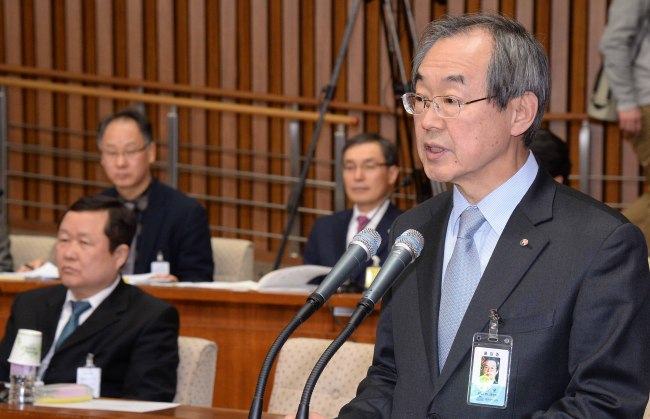Lawmakers from the ruling and main opposition parties began hearing from state-run energy companies Thursday, as part of their probe into former President Lee Myung-bak’s “resource diplomacy” initiative.
The project spearheaded by Lee, President Park Geun-hye’s predecessor, aimed to reduce South Korea’s dependence on Middle Eastern oil by investing state money in foreign energy projects.
Lawmakers agreed to launch the parliamentary probe amid escalating criticism that many of its investment decisions resulted in huge losses. Meanwhile, Lee’s supporters have claimed that the investigation is part of a “political witch hunt” and that it is too early to declare the initiative a failure.
 |
Suh Moon-kyu, president of the Korea National Oil Corp., reads reports to parliamentary committee members on overseas energy investments by state-controlled firms at the National Assembly in Seoul, Thursday. (Lee Gil-dong/The Korea Herald) |
Rep. Choi Min-hee of the main opposition New Politics Alliance for Democracy, raised speculations that the state-run oil developer Korea National Oil Corp. acquired part of a Canadian oil refinery by paying more than 1 trillion won ($900 million). The Lee government was aware of the deal but turned a blind eye, he said.
In a feasibility report conducted by the Korea Institute of Geoscience and Mineral Resources, the value of the upstream oil sector of the oil refinery was estimated at $1.61 billion. But the KNOC purchased the sector for $2.77 billion based on its own calculations, he claimed.
The opposition lawmaker also accused the then-Energy Minister Choi Kyung-hwan of ignoring the feasibility report by the mineral resource institution and held him responsible for wasting billions of won of state funds. Choi now serves as finance minister.
“Finance Minister Choi Kyung-hwan, who was then the energy minister, didn’t take any action even though he had this report that stated negative views (of the acquisition),” said Rep. Choi. “He should be held responsible.”
Rep. Jeon Jeong-hee also claimed that the state oil firm purchased Harvest Operations Corp. knowing that its affiliate NARL, which operates the downstream sector of the refinery, was not profitable.
“The then-KNOC president Kang Young-won was asked by Harvest Operations Corp. to acquire NARL and requested GS Caltex to conduct an asset valuation,” the lawmaker said.
GS Caltex suggested to Kang that the deal would not be profitable, but he purchased the firm the next day, she claimed.
The ruling Saenuri Party, however, defended the project, urging opposition lawmakers not to criticize the previous government’s overall overseas resource initiative by highlighting the parts of deals that suffered losses.
Rep. Kim Tae-heum of the Saenuri Party said that the opposition party was attempting to shift the responsibility onto the minister, stressing that the final decision on the deals was in the hands of KNOC executives.
Incumbent KNOC president Suh Moon-kyu, denied the opposition lawmakers’ claim that the deal was not a success, saying that South Korea had secured 60 million barrels of oil by purchasing the Canadian oil refinery.
“We think that the acquisition of NARL is the only failure,” he said. “Harvest is a company with potential, and we believe that we could absorb the losses in the long term.”
By Cho Chung-un (
christory@heraldcorp.com)








